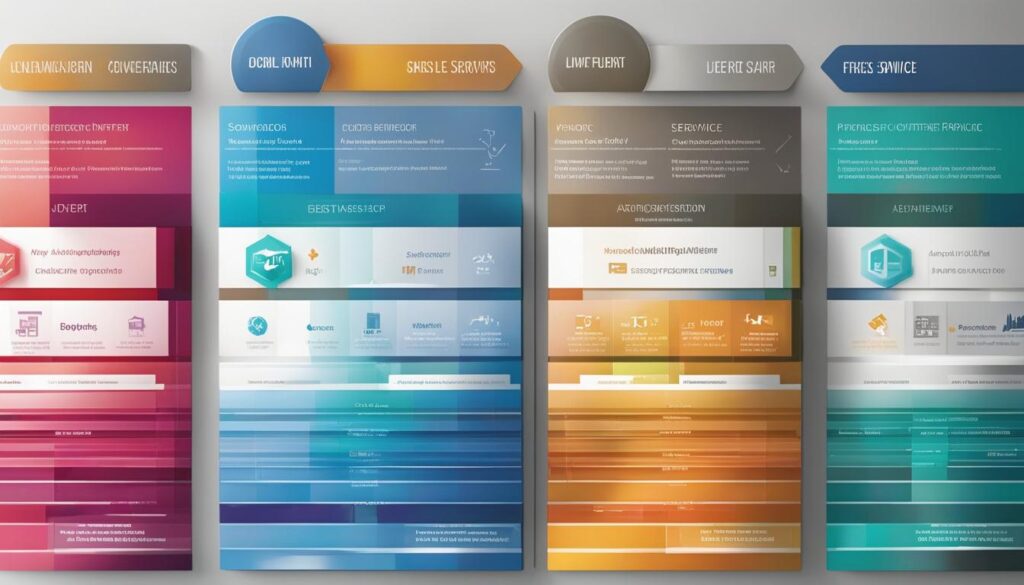Starting a professional organizing business can be a rewarding venture for those with a passion for creating order and helping others achieve a clutter-free and organized home. As a professional organizer, you will provide valuable home organization services, decluttering services, and organizing solutions to clients who are seeking to improve their living spaces.
To successfully launch your own professional organizing business, careful planning and preparation are essential. This article will guide you through the process, providing valuable insights and step-by-step instructions to help you build a thriving and successful business.
Table of Contents
ToggleKey Takeaways
- Researching the professional organizing industry is crucial for a successful launch.
- Choosing a unique name for your business and checking its availability is important.
- Address legal, financial, and logistical considerations to ensure a solid foundation.
- Developing your services and pricing structure requires careful evaluation of costs and rates.
- Creating a strong marketing and branding strategy will help attract clients and promote your services.
Researching the Professional Organizing Industry
Before starting a professional organizing business, it is crucial to conduct thorough research on the industry. By gaining a deep understanding of the professional organizing industry, you can position yourself for success and stand out from the competition.
One valuable resource for research is organizing books. These books provide valuable insights, tips, and techniques from experienced organizers. They can serve as your guide and source of inspiration as you embark on your journey to becoming a professional organizer.
Organizing blogs are another great source of information. They offer a wealth of practical advice, creative ideas, and case studies that can help you refine your organizing skills and learn about industry trends. Regularly reading these blogs can keep you up-to-date with the latest practices and strategies in the field.
Joining professional organizations within the industry can provide you with numerous benefits. These organizations offer networking opportunities, educational resources, and access to industry experts. Connecting with fellow organizers can provide valuable support, guidance, and mentorship as you navigate the challenges and opportunities in your career.
Having a mentor or business consultant in the professional organizing industry can significantly contribute to your growth and success. A mentor can offer invaluable insights, share their experiences, and provide guidance specific to your business goals. They can help you develop your skills, expand your network, and avoid common pitfalls.
Additionally, it is essential to conduct market research to identify your target clients and their specific needs. This research will help you develop a niche within the industry and position yourself as an expert in a particular area. By specializing in a specific niche, you can attract clients who are seeking your unique expertise and increase your chances of success.
By thoroughly researching the professional organizing industry through organizing books, blogs, professional organizations, mentorship, and market research, you can gain the knowledge and insights needed to launch and grow a successful professional organizing business.
Naming Your Business
Choosing a unique name is a crucial step when starting your own professional organizing business. A well-thought-out name can help you stand out in a competitive market and create a strong brand identity. However, before finalizing your business name, there are a few important considerations to keep in mind.
Domain Availability
One of the first things you should do is check the availability of the domain name that matches your preferred business name. A domain name is the web address potential clients will use to find your business online. A memorable and relevant domain name can help improve your online visibility and make it easier for customers to find you. Use a domain registration service to search for available domain names related to your business name.
Business Registration
Once you have chosen a name and confirmed its availability as a domain, it’s essential to register your business with the appropriate authorities. This step ensures that your chosen business name is legally protected and no one else can use it. Contact your state’s Secretary of State office to understand the registration requirements and complete the necessary paperwork. Registering your business name also helps establish your credibility and professionalism as a professional organizer.
DBA Filing
If you plan to operate your professional organizing business under a name that is different from your legal name, you may need to file for a DBA (Doing Business As) registration. A DBA allows you to use your chosen business name while maintaining your legal identity. It is especially important if you wish to conduct business transactions, open a business bank account, or enter into contracts using your business name. Check with your local government offices or small business administration to understand the DBA filing requirements in your area.
Take the time to carefully consider and research potential business names, ensuring that they align with your brand identity and values. Once you have finalized a unique and available name, register it and file for a DBA if necessary. This will set a solid foundation for your professional organizing business and help you establish a strong presence in the industry.
Legal, Financial, and Logistical Considerations
When starting a professional organizing business, there are several important legal, financial, and logistical considerations that need to be addressed. These factors play a crucial role in ensuring the smooth and successful operation of your business. You must be proactive in taking the necessary steps to establish a solid foundation for your professional organizing venture.
Creating a Business Plan
One of the first steps in starting a professional organizing business is to create a comprehensive business plan. This plan will serve as a roadmap for your business goals, strategies, and financial projections. It is an essential tool for attracting potential investors and securing funding if needed. A well-crafted business plan will outline your target market, competition analysis, marketing strategies, and financial forecasts.
Deciding on a Business Structure
Choosing the right business structure is another important consideration. The most common options for a professional organizing business are sole proprietorship, partnership, limited liability company (LLC), and corporation. Each structure has its own advantages and disadvantages in terms of liability protection, tax implications, and operational flexibility. Research each option thoroughly and consult with a lawyer or accountant to determine the most suitable structure for your business.
Registering Your Business
Registering your business is a critical step in establishing its legitimacy. Depending on your chosen business structure, you may need to register your business with the appropriate government agencies, such as the Secretary of State’s office or your local county clerk’s office. This registration process ensures that your business is recognized and operates within the legal framework.
Researching Tax Requirements
Understanding and complying with tax requirements is essential for any business. As a professional organizer, there may be specific tax obligations and considerations that apply to your business. Speak with a tax professional to determine your federal, state, and local tax requirements. They will provide guidance on issues such as income tax, sales tax, and self-employment tax.
Obtaining Business Insurance
Protecting your business from unforeseen circumstances is crucial. Obtain appropriate business insurance to mitigate the risks associated with your profession. Insurance coverage such as general liability insurance and professional liability insurance can provide financial protection in the event of accidents, property damage, or lawsuits related to your services.
Setting Up Banking and Accounting Systems
Establishing robust banking and accounting systems is essential for managing your business finances. Open a separate business bank account to keep your personal and business finances separate. This will streamline your record-keeping and make tax compliance easier. Additionally, implement accounting software or hire a professional bookkeeper to ensure accurate financial tracking and reporting.
Establishing a Routine for Business Tasks
To maintain efficiency and organization in your professional organizing business, it is crucial to establish a routine for completing essential business tasks. This includes regular bookkeeping and financial analysis, client invoicing and payment tracking, and administrative duties. By establishing a consistent routine, you can stay on top of your business obligations and provide excellent service to your clients.

Developing Services and Pricing
As a professional organizer, developing services and setting the right pricing structure is crucial for the success of your business. Here are the key steps to consider:
- Create a List of Services: Start by determining the range of services you will offer to your clients. This could include home organization, decluttering, space optimization, digital organization, or specialized services for specific needs such as moving or downsizing.
- Estimate Your Business Costs: Take into account all the costs associated with running your business, including supplies, equipment, transportation, marketing, and any other overhead expenses. This will help you determine the minimum pricing you need to cover your costs and make a profit.
- Determine Your Rates: There are various ways to set your rates, such as hourly rates, tiered pricing, package rates, or project-based pricing. Consider your experience, expertise, and the value you bring to your clients when deciding on your rates. Research the industry averages to ensure your rates are competitive.
- Establish Billing Policies: Clearly define your billing policies, including payment methods, accepted forms of payment, and the timeframe for payment. Decide whether you will require a deposit upfront or offer payment plans to clients. It is essential to communicate your policies clearly to avoid any misunderstandings or payment issues.
- Set Up Accounting Software: Implementing accounting software is vital for managing your finances effectively. It will help you track your income, expenses, and invoices, simplifying your bookkeeping tasks. Look for accounting software that offers features tailored to small businesses and integrates well with other tools you may use.
- Consider Hiring a Bookkeeper or Accountant: If managing the financial side of your business is overwhelming, you may want to consider hiring a professional bookkeeper or accountant. They can assist you with tasks such as tracking expenses, preparing tax documents, and providing financial insights to help you make informed business decisions.
| Services and Pricing Considerations | Pricing Models |
|---|---|
| Home organization | Hourly rates |
| Decluttering | Tiered pricing |
| Space optimization | Package rates |
| Digital organization | Project-based pricing |
| Moving or downsizing services |
Remember, pricing your services appropriately is crucial for the sustainability of your business. Consider factors such as your target market, the complexity of the project, and the value you provide to your clients when determining your rates. Regularly evaluate and adjust your pricing as needed to ensure your business remains profitable.
“Setting the right pricing structure is crucial for the success of your professional organizing business.”

Marketing and Branding
Marketing and branding are essential for the success of a professional organizing business. A well-developed marketing strategy helps you reach your target audience and showcase your unique organizing services. Effective branding ensures that your business stands out and creates a lasting impression on potential clients.
Creating a Strong Online Presence
To establish a strong online presence, it is crucial to purchase a domain name that reflects your business and set up website hosting. A professional website showcases your services, highlights your expertise, and provides a platform for potential clients to contact you.

Creating a visually appealing logo is another important aspect of branding. A logo represents your business and helps clients recognize and remember your brand. When designing your logo, consider the colors, fonts, and symbols that align with the image you want to portray.
Showcasing Your Expertise
A professional bio allows you to showcase your experience and expertise in the organizing industry. Craft a compelling and concise bio that highlights your unique qualifications and demonstrates why clients should choose your services.
When networking or meeting potential clients in person, business cards and stationery are valuable tools to leave a lasting impression. Design business cards that are visually appealing, include your contact information, and reflect your branding elements.
Social Media and Marketing Strategies
Social media platforms are powerful marketing tools for a professional organizing business. Establish profiles on platforms such as Facebook, Instagram, and LinkedIn to reach a wider audience and engage with potential clients. Create compelling content, share organizing tips, and leverage the networks of your friends, family, and clients to expand your reach.
“I love using social media to share organizing tips and connect with potential clients. It allows me to showcase my expertise and build a community of like-minded individuals.” – Sarah Johnson, Professional Organizer
In addition to social media, implement other marketing strategies to promote your services. This may include creating a blog to share organizing insights, contributing guest articles on relevant websites, and utilizing email marketing campaigns to stay connected with your audience.
Networking and Referrals
Networking is a valuable practice to expand your professional connections and generate referrals. Attend industry events, join local business organizations, and engage in online communities to build relationships with fellow organizers and potential clients.
“Networking has been crucial to the growth of my organizing business. By establishing relationships with other professionals, I have received valuable referrals and opportunities for collaboration.” – Emily Davis, Professional Organizer
Encourage satisfied clients to refer your services to their friends, family, and colleagues. A positive word-of-mouth recommendation is a powerful marketing tool that can bring in new clients.
Continuous Evaluation and Adaptation
As you implement your marketing and branding strategies, it is important to continuously evaluate their effectiveness. Monitor website analytics, track social media engagement, and collect feedback from clients to assess the impact of your efforts. Use these insights to make data-driven decisions and adapt your marketing strategies as needed.
By investing time and effort into marketing and branding, you can effectively promote your professional organizing business and attract new clients who are in need of your organization expertise.
Defining the Client Experience and Creating Systems
Providing a positive client experience and creating efficient organizing systems are crucial aspects of running a successful professional organizing business. To ensure client satisfaction and enhance your business processes, focus on understanding and meeting clients’ needs, handle feedback constructively, and continuously improve your systems and processes.
Understanding and Meeting Clients’ Needs:
Every client has unique requirements and expectations. Take the time to listen and understand their goals, preferences, and pain points. By gaining a deep understanding of their needs, you can tailor your organizing approach and provide personalized solutions. This will enhance the client experience and leave a lasting positive impression.
Handling Feedback Constructively:
Feedback plays a vital role in improving your services and meeting client expectations. Embrace feedback as an opportunity for growth and welcome it with an open mind. Actively listen to your clients’ suggestions, concerns, and recommendations, and use their feedback to continuously refine your organizing process. This proactive approach will demonstrate your commitment to delivering exceptional service.
“Feedback is a gift that helps me improve and better serve my clients.”
Efficient Systems for Enhanced Organization
Developing efficient systems is key to delivering consistent and high-quality results to your clients. Here are some practices that can help streamline your organizing process:
- Categorization: Establish a systematic approach to categorizing items based on their function, importance, or frequency of use. This will simplify the organizing process and make it easier to find and maintain items.
- Labeling and Containerizing: Use clear labels and appropriate storage containers to ensure items are easily identifiable and accessible. This will save time for both you and your clients and maintain the organization long after you leave.
- Workflow Optimization: Identify bottlenecks and inefficiencies in your workflow and implement strategies to streamline and expedite the organizing process. This will help you deliver faster results and improve overall client satisfaction.

Continuous Improvement:
Never settle for the status quo. Strive to continually enhance your organizing systems, staying up to date with industry trends and incorporating new methodologies. By embracing a mindset of continuous improvement, you can refine your processes, deliver greater value to your clients, and propel your professional organizing business to new heights.
Delivering Value to Clients:
As a professional organizer, your expertise goes beyond creating clean and organized spaces. Provide valuable insights, tips, and resources to empower your clients to maintain their newly organized environments. Offer ongoing support and guidance to help them establish sustainable habits and systems that promote long-lasting organization.
“I am committed to delivering exceptional value to my clients, empowering them to live clutter-free and organized lives.”
Starting as a Side Hustle
Starting a professional organizing business as a side hustle is a fantastic way to leverage your organizing skills while earning extra income alongside your full-time job. It offers the flexibility to work part-time and gradually transition into a full-time career as a professional organizer if that’s your ultimate goal.
By starting as an independent contractor, you can take on organizing projects on a part-time basis, allowing you to balance your current job and your budding organizing business. This arrangement provides the freedom to choose the number of projects you take on, affording you the flexibility to mold your business according to your availability.
Working part-time as a professional organizer not only allows you to explore your passion but also provides an opportunity to test the waters and determine if this is the right career path for you. It helps you gain valuable experience and confidence in your abilities while developing a solid client base.
Having a side hustle in professional organizing allows you to diversify your income and explore new opportunities. It is an excellent way to supplement your existing earnings and establish yourself in the industry without the pressure of depending solely on your business for financial stability.
Flexibility and Growth Potential
One of the key advantages of starting as a side hustle in professional organizing is the flexibility it offers. You can choose to work evenings, weekends, or specific hours that align with your current job. This flexibility allows you to cater to clients with different schedules, increasing your chances of finding organizing projects that fit your availability.
As your side hustle grows, and you start to gain more clients and projects, you have the opportunity to transition into a full-time professional organizing business. This process can occur organically as your business expands, allowing you to gradually transition into your dream career while maintaining a steady income during the initial stages.
Furthermore, beginning as a side hustle helps you test and refine your organizational processes, pricing models, and services. You can experiment with various strategies and adjust your approach based on client feedback and the evolving needs of your target market. This flexibility enables you to fine-tune your business operations and position yourself for long-term success.
“Starting as a side hustle allows you to explore your passion, gain experience, and build a solid foundation for your professional organizing business, all while maintaining the security of a full-time job.”
Diversifying Income with Part-Time Organizing
Starting a professional organizing business as a side hustle provides an excellent opportunity to create multiple income streams. As you take on more organizing projects, you can generate additional revenue that complements your primary source of income.
The extra income generated from your part-time organizing business can be used to pay off debts, boost savings, invest in personal development, or fund other entrepreneurial ventures. It not only provides financial security but also offers the freedom to pursue your dreams and aspirations.
“A successful side hustle in professional organizing offers the best of both worlds: the stability of a full-time job and the excitement of building a flexible and profitable business that aligns with your passion.”
Whether you choose to keep your professional organizing business as a thriving side hustle or transition into a full-time career, starting part-time allows you to build a solid foundation and gain invaluable experience. It’s a journey that lets you explore your entrepreneurial spirit, unleash your creativity, and make a positive impact in the lives of your clients while enjoying the benefits of increased income and flexibility.
Recognizing the Value of Your Skills
As a professional organizer, I understand the immense value of organizing skills and the profound impact they can have on clients’ lives. The ability to create order and improve efficiency is indispensable to individuals and businesses seeking professional organizing services.
When investing in professional organizing services, clients receive multiple layers of value. It goes beyond simply decluttering physical spaces; it extends to the mental and emotional well-being of individuals. By organizing their surroundings, clients experience reduced stress, increased productivity, and improved overall quality of life.
“Organizing is similar to being a life coach, therapist, personal trainer, and more. It’s about helping clients regain control, find peace, and achieve their goals,” says expert professional organizer Lisa Smith. Clients benefit from the profound impact that professional organizing services can have on their lives.
“The value of organizing skills lies not only in the tangible results but also in the intangible benefits. Clients experience a sense of empowerment, gain clarity in their thoughts, and unlock their full potential,”
Investing in professional organizing services is an investment in oneself. When clients recognize the value of their own time, energy, and mental well-being, they understand the importance of seeking professional help. It allows them to focus on their core priorities while leaving the organizing tasks to experts.
“As a professional organizer, I bring multiple layers of value to my clients,” states experienced organizer Sarah Thompson. “Not only do I transform their physical spaces, but I also provide guidance, support, and ongoing motivation to help them maintain an organized lifestyle.”
| Benefits of Investing in Professional Organizing Services | |
|---|---|
| 1. Increased productivity and efficiency | |
| 2. Reduced stress and improved mental well-being | |
| 3. Enhanced focus on core priorities | |
| 4. Clarity in thoughts and decision-making | |
| 5. Improved time management skills | |
| 6. Expert guidance and ongoing support |
Investing in professional organizing services is an investment in reclaiming control, finding peace, and optimizing one’s surroundings. By recognizing the value of organizing skills, individuals and businesses can unlock their full potential and create a life of order, efficiency, and harmony.
Conclusion
Starting a professional organizing business is an exciting venture that requires careful planning and research. By following the steps outlined in this guide, you can set yourself up for a successful launch and ongoing success in your career as a professional organizer.
Remember, the key to running a thriving professional organizing business is to stay informed about industry trends and continuously improve your skills. Keep an eye on organizing books, blogs, and professional organizations to stay up-to-date with the latest tools, techniques, and strategies.
Additionally, providing exceptional service to your clients is essential for maintaining a loyal customer base and attracting new referrals. Strive to create a positive client experience, listen to feedback, and continuously refine your organizing process for optimal results.
As you embark on this exciting journey, embrace the opportunity to positively impact people’s lives by bringing order and efficiency into their homes and businesses. With dedication, passion, and a commitment to continuous learning, you can create a fulfilling and successful career as a professional organizer.
FAQ
How do I research the professional organizing industry?
Researching the professional organizing industry involves reading organizing books and blogs, joining professional organizations for networking and education, and finding a mentor or business consultant.
How do I choose a name for my professional organizing business?
Before finalizing a name, check its availability as a domain name and with your state’s Secretary of State office for business registration. If necessary, file for a DBA (Doing Business As) to legally operate under your chosen business name.
What legal, financial, and logistical considerations should I address when starting a professional organizing business?
Consider creating a business plan, deciding on a business structure, registering your business with the appropriate agencies, researching tax requirements, obtaining business insurance, setting up banking and accounting systems, and establishing a routine for business tasks.
How do I develop my services and pricing structure for a professional organizing business?
Develop a list of services you will offer, estimate your business costs, determine your rates (hourly, tiered, package, project, etc.), establish billing policies, and set up accounting software to manage your finances. Consider hiring a bookkeeper or accountant to assist with financial tasks if needed.
What should I do to market and brand my professional organizing business?
Purchase a domain name and set up website hosting, create a logo and professional bio, design business cards and stationery, establish social media profiles, and implement marketing strategies to promote your services. Utilize networking opportunities and seek referrals from friends, family, and clients.
How do I provide a positive client experience and create efficient organizing systems?
Focus on understanding and meeting clients’ needs, handle feedback constructively, and continuously improve your processes. Deliver value to clients by using your organizing expertise and offering support on multiple levels.
Is it possible to start a professional organizing business as a side hustle?
Yes, starting as a side hustle allows you to utilize your organizing skills and make extra income while maintaining a full-time job. You can gradually transition into a full-time career as a professional organizer if desired.
How should I recognize the value of my organizing skills as a professional organizer?
Recognize the value of your organizing skills and the impact they can have on clients’ lives. Embrace the role of being a life coach, therapist, personal trainer, and more, as you bring multiple layers of value to your clients.
What are the steps to start a professional organizing business?
Starting a professional organizing business requires careful planning, research, and continuous learning. By following the steps outlined in this guide, you can successfully launch your own organizing business and create a fulfilling career as a professional organizer.











